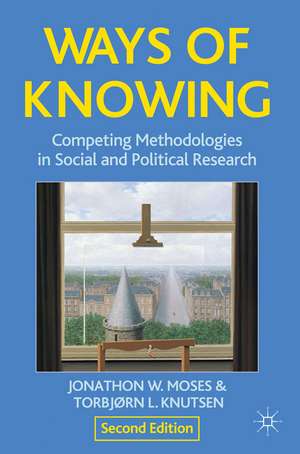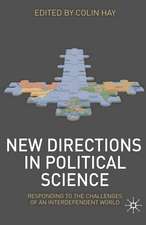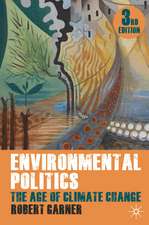Ways of Knowing: Competing Methodologies in Social and Political Research
Autor Jonathon Moses, Torbjørn Knutsenen Limba Engleză Paperback – 13 iun 2012
The textbook is ideal for undergraduate and master degree students who are taking icourses on philosophy of social science, social and political analysis and research methods.
Preț: 267.23 lei
Nou
Puncte Express: 401
Preț estimativ în valută:
51.14€ • 55.53$ • 42.96£
51.14€ • 55.53$ • 42.96£
Carte tipărită la comandă
Livrare economică 18-24 aprilie
Preluare comenzi: 021 569.72.76
Specificații
ISBN-13: 9780230360693
ISBN-10: 0230360696
Pagini: 348
Ilustrații: 8 b/w tables, 24 figures
Dimensiuni: 155 x 235 x 20 mm
Greutate: 0.56 kg
Ediția:Revizuită
Editura: Macmillan Education UK
Colecția Red Globe Press
Locul publicării:London, United Kingdom
ISBN-10: 0230360696
Pagini: 348
Ilustrații: 8 b/w tables, 24 figures
Dimensiuni: 155 x 235 x 20 mm
Greutate: 0.56 kg
Ediția:Revizuită
Editura: Macmillan Education UK
Colecția Red Globe Press
Locul publicării:London, United Kingdom
Cuprins
Introduction .-
Philosophy
of
Naturalist
Science .-
The
Experimental
Method .-
The
Statistical
Method .-
The
Comparative
Method .-
History,
Interviews
and
Case
Studies .-
Sowing
Doubts
about
the
Naturalist
Methodology .-
A
Constructivist
Philosophy
of
Science .-
From
Story-Telling
to
Telling
Histories .-
Comparing
Contexts .-
Contextualizing
Statistics .-
Interpretive
Experiments .-
Conclusion.
Notă biografică
Jonathon
W.
Moses
Professor
of
Political
Science,
Norwegian
University
of
Science
and
Technology,
Trondheim,
Norway.
Torbjørn L. Knutsen Professor of International Relations, Norwegian University of Science and Technology, and Adjunct Professor, The Norwegian Air Force Academy, Trondheim, Norway.
Torbjørn L. Knutsen Professor of International Relations, Norwegian University of Science and Technology, and Adjunct Professor, The Norwegian Air Force Academy, Trondheim, Norway.
Caracteristici
- Introduces
the
history,
logic
and
practice
of
the
key
philosophical
traditions
that
stand
behind
social
and
political
research,
positivism
and
constructivism,
spelling
out
how
they
inform
different
ways
of
knowing
- Integrates
a
range
of
key
topics
and
issues
-
from
the
nature
of
knowledge
to
the
strengths
and
weaknesses
of
the
main
research
methods
-
showing
how
methodological
pluralism
can
be
combined
with
intellectual
rigour
- Summarize
complex
ideas
in
a
clear
and
accessible
way
- Expanded
discussion
of
the
similarities
between
positivist
and
constructivist
approaches
- Additional
contemporary
examples
which
illustrate
the
utility
of
methodological
pluralism








